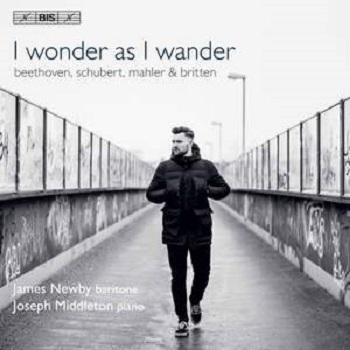Recorded only five years since his graduation from Trinity Laban, this is an excellent debut CD from the not-yet-thirty-year-old James Newby, already with a string of prizes including the prestigious Kathleen Ferrier Award. His programme focusses on the perpetual search for the unattainable and is centred around Beethoven’s cycle An die ferne Geliebte with songsby Mahler and Schubert and bookended by several of Britten’s folksong arrangements. It’s an anthology that brings together songs of exile and unfulfillment, all well suited to this young soloist’s expressive range.
Newby’s is a wonderfully even baritone voice, velvet-smooth and secure throughout the range with an unshakable technique. Newby may not yet have the upholstered richness of a Matthias Goerne or the variety of colour of Roderick Williams, but he finds just the right interior world for the five Britten settings. Above all, he is a great communicator, setting out his credentials for storytelling in the sparely accompanied title track I wonder as I wander, conveying its message with a wonderfully hushed numinosity, as well as a theatrical flourish to underline Christ’s commitment for our salvation. Singing above the stave he creates exquisite poise in lingering sotto voce passages. There’s none to soothe has a similar rapt quality that reappears near the end of the disc in the nocturnal At the mid hour of night; the first of three settings of Thomas Moore’s Irish melodies that appeared in 1960 as volume four of Britten’s folksong collections. It’s beautifully rendered here, as is The last rose of summer where regret is tempered with bitterness in Newby’s darkly intense response to the poet’s metaphor for loneliness. Middleton’s gently rocking accompaniment and Newby’s palliative tone belies the sourness of Sail on, sail on where an encounter with nature’s stormiest seas is preferable to the falsehood of man.

Britten was a lifelong admirer of Mahler whose songs from Des Knaben Wunderhorn are produced here with panache and great sensitivity. Britten would surely have related to the pacifism implicit in the soldierly imaginings of Revelge where Newby brings a welcome authoritative glint to his voice. Middleton is at his most energetic conjuring drum rolls, marching rhythms and hooves of stamping horses; all captured with cinematic illumination. There’s plenty of swagger too, with Newby investing cynicism in the final “Tralali”, reminding us of the anonymous poet’s anti-war sentiments. Newby responds to the hymn-like Urlicht (a song later transferred to contralto for Mahler’s Second Symphony) with an extraordinary depth of feeling and a voice almost wreathed in incense. He fully explores its solemnity and halting lines with tenderness and passion (most notably the line “Ich bin von Gott, und will wieder zu Gott!” (I am from God and to God I will return!) which left me searching for superlatives. His mixing of falsetto into the voice’s upper reaches is equally convincing too, and heard most effectively in the dramatic Zu Straßburg auf der Schanz when a frantic soldier addresses his comrades one last time before his execution for desertion.
Hints of operatic drama occur more overtly in the scena that is Schubert’s Der Wanderer, D489whereNewby’ssepulchral tones perfectly match the fragmented phrases of the joyless wanderer. Elsewhere, a grainy quality occupies his lowest notes in the melancholy Auf der Donau, yet it’s sung with a sensibility attuned to the poet’s doom-laden text. He also persuades with warmth of tone as the lonely traveller within the more homespun Im Freien, eliciting a uniformly pleasing tone that’s carried over into the yearning of Schubert’s late song Abendstern where the poet longs for companionship but is condemned to live alone. Once again, Newby catches you by surprise with the heart-stopping tenderness of his sotto voce, Schubert’s whispered phrases suspended with haunting delicacy.
Beethoven’s singular song cycle An die ferne Geliebte belongs to 1816 and is asetting of a pastoral text by the writer and physician Alois Jeitteles (1794-1858). Within its half dozen songs,timeless emotions are expressed by a forlorn, solitary lover dreaming of fulfilment while gazing towards azure skies and rolling mountains. Newby variously glows and growls in conjuring the dewy-eyed swain, lingering here and pushing there to emphasise longing and distress in ‘Auf dem Hügel sitz ich spähend’. Tranquilty is glimpsed in ‘Wo die Berge so blau’ only to be swept aside in the curt gestures of ‘Leichte Segler in den Höhen’. As ever, Middleton is a sensitive partner and readily conjures rippling brooks and summer swallows in ‘Es kehret der Maien’, completely at one with Newby who closes the cycle with spendidly youthful ardour in ‘Nimm sie hin denn, diese Lieder’. Two additional songs by Beethoven, Adelaide and Maigesang, offer furtherdemonstration of Newby and Middleton’s compatibility in this detailed and involving partnership recorded in 2019 at Potton Hall, Suffolk. In short, this is a significant release and one not to be missed.
David Truslove
I Wonder As I Wander: James Newby (baritone) and Joseph Middleton (piano)
Trad. (arr. Britten): I wonder as I wander, There’s none to soothe, At the mid hour of night, The last rose of summer, Sail on, sail on; Schubert: Der Wanderer, D 489, Der Wanderer D 649, Auf der Donau, D 553, Im Freien, D 880, Abendstern, D 806; Beethoven: Adelaide, Op. 46, Maigesang, Op, 52, No. 4, An die ferne Geliebte, Op. 98; Mahler: Zu Straßburg auf der Schanz, Revelge, Urlicht.
BIS BIS-2475 [SACD]
ABOVE: James Newby © Gerard Collett